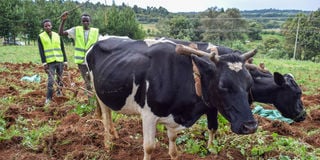Biz Lounge: How decision to harvest using bulls grew into lucrative business

Robert Kibet with the help of his brother harvest potatoes at a farm in Kuresoi South on 13th November, 2024.
Robert Kibet is a farmer with the knack to train bulls used for ploughing and harvesting in Nakuru’s Kuresoi South sub county.
For the 30-year-old, he always knew that no matter how far he strayed, he would always come back to agriculture as this is the only economic activity he saw his parents involved in from a young age.
It was this same activity that funded his school from the formative years to college, where he did a certification course in wiring.
Once done with the course, Kibet tucked the certificate away, put on his overalls and gumboots, and went looking for his first true love; agriculture.
So deep is agriculture entrenched in the family, that Kibet calls this move ‘continuing the family legacy’.
“My parents gave me a piece of land, and that’s how my agricultural journey began,” he explains, noting that he delved into potato and maize farming.
Lucky for him, the first harvest was bountiful earning him handsome returns.
After selling his crops, Kibet says he purchased two three-year-old bulls for Sh. 40,000 each.
Having secured the bulls, he then started his journey in ploughing and harvesting, using a plough plate that his father had passed down to him.
But first, training the bulls was essential. Kibet says this became a key part of his routine to ensure they followed the furrow, stopped, and moved as directed.
"The training wasn’t too difficult since we used the bulls regularly. It also helped that they were the same size and could pull evenly," he adds.
Kibet tag teamed with his brother whose job is to help guide the bulls, making harvesting in large farms easier.
So what prompted him to use a plough plate?
Kibet says during harvesting of potatoes on his farm, he realized that traditional jembes were damaging the potatoes and slowing down the harvest. To address this, he customized his plough plate to minimize crop damage.
"Potato damage is a challenge for many farmers, impacting the quality and marketability of their produce. I custom-made the disc that wouldn't damage the potato. I wanted a solution not just for myself but for other farmers in my community,” he says.
Kibet now charges Sh. 2,000 per acre for harvesting and Sh. 3,000 per acre for weeding, often covering up to three acres in a day.
“This work has allowed me to support my family and pay for my children's school fee. I’m glad I can help other farmers in my community too," he adds.
Kibet has also created job opportunities for young people, hiring them on contract basis and paying them Sh. 300 to Sh 500, depending on the size of the farm.
Asked about the challenges that his ingenious business can encounter, Kibet notes heavy rains and sick animals as great setbacks, as these two bring the work to an immediate standstill.
Looking into the future of his business, Kibet says he plans to acquire more bulls, employ more youth, and expand into large-scale farming.
